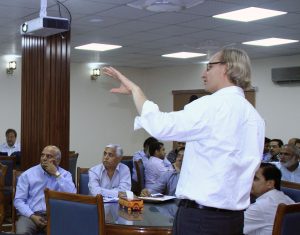Only by training the trainers can a sustainable curriculum be created. The USPCAS-W team is building the capacity of educators in Pakistan. In turn, these educators can more effectively train the future water engineers the country needs to address critical water issues.
Course Mentoring is a key element of the curriculum advancement program for USPCAS-W. We connect faculty in Pakistan with partners in the U.S. and other countries to improve course content, modernize teaching methodology, and establish best practices. Experiential training topics include research development, research conduct, and effective teaching, among others. This opportunity also generates professional connections that feed the research side of USPCAS-W. Participants learn by doing.
Through on-site visits to Pakistan and remote consultations, our team offers:
- focused teaching workshops with hands-on training across many aspects of modern curriculum development and teaching
- one-on-one mentoring for specific courses
Since 2014,USPCAS-W has created four MS programs and three PhD programs at Mehran University of Engineering and Technology (MUET). To date, Over 75 courses have received direct course mentoring and every faculty member at MUET has received both one-on-one training and hands on experience in training workshops.
MUET offers degree programs in:

Innovation for Impact
In May, team members from the U.S. travelled to MUET in Pakistan for a series of workshops. The theme for the mission was “Innovation for Impact.” Building on this theme, the team worked to more deeply engage MUET faculty, students, and stakeholders in a collaborative process...

HID
Students in Hydraulics, Irrigation & Drainage come to a better understanding soil, water and plant relationships and how they can be applied to better manage surface and groundwater resources in the production of food.

IWRM
Integrated Water Resource Management students focus on hazard planning and management, water governance, water dispute management, water valuation, and GIS and remote sensing.

ENV.ENG
Our Environmental Engineers apply scientific and engineering principles in dealing with adverse environmental factors, protecting the environment, and improving its quality.

WaSH
Water, Sanitation and Hygiene scholars aquire the skills and knowledge to work with stakeholders to assess, implement, improve, and sustain water and sanitation systems.
Highlighted Trainings
Teaching Methodology
Faculty consider the qualities that make a good teacher, explore backward instructional design, and define learning objectives. Time is spent exploring Bloom’s taxonomy, assessment techniques, and teacher effectiveness. The training includes opportunities for faculty to demonstrate newly learned skills through hands-on activities.
Effective Teaching Bootcamp
An accelerated program focused on four key areas that support faculty professional development: teaching, student outcomes, experiential learning, and project-based learning. Examples from the semester and faculty experience are incorporated throughout the training. Participants compile best practices for the future.
Modernizing Curriculum
An overview of concepts and ideas for modernizing curriculum. This training is based on examples and synthesis from reports and literature with an emphasis on the UNESCO report on Quality Curriculum.
.......
This program is made possible by the support of the United States Government and the American people through the United States Agency for International Development (USAID). The contents are the sole responsibility of the University of Utah and do not necessarily reflect the views of USAID or the United States Government.
